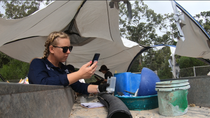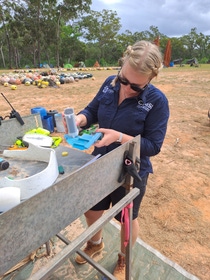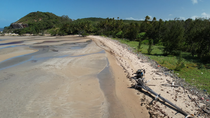BASF Australia provides trinamiX portable solution to help Tangaroa Blue with beach clean-up efforts at remote Cape York

Earlier this month, a trinamiX Mobile NIR Spectroscopy Solution (for Plastics Identification) from BASF Australia travelled up to Cape York in Far North Queensland to help Tangaroa Blue, an Australian charity dedicated to the health of our marine environment removing and preventing marine debris, in a clean-up of one of Australia’s most remote beaches.
BASF ANZ has worked with the Tangaroa Blue Foundation in many different capacities for a number of years now, with the aim of supporting their effort to coordinate the Australian Marine Debris Initiative (AMDI). Since the program started in 2004, more than 23 million pieces of marine debris have been removed from the Australian coastline, the data is then collated and input into the AMDI.
In addition to this, Tangaroa Blue also lead the Operation Clean Sweep initiative; a nation-wide program which aims to work with industry stakeholders to help keep plastic pellets out of the environment, of which BASF is a signatory.

Working in collaboration with the Wuthathi Traditional Custodians and Cape York Natural Resource Management, Tangaroa Blue coordinated a clean-up of the site which has never been cleaned before due to its lack of access via road or boat. Despite its inaccessibility, Tangaroa Blue’s annual Cape York marine debris helicopter survey showed that it had one of the highest marine debris loads on the coastline, which seems puzzling until you learn that 100% of this debris was from offshore sources, having been deposited on this once pristine beach by the waves.

The clean-up was a huge success, with more than 10 tonnes of marine debris being removed from over three kilometres of coastline. This included more than 300,000 individual items, consisting of thousands of plastic bottles, 1.3 tonnes of net and rope, 345 kilograms of commercial fishing beacons and six ghost nets, which were all extracted from the area via helicopter. It was also eye opening as to the amount of debris that washes up on this remote beach. BASF Australia's trinamiX handheld solution supported the clean-up efforts, by not only assisting the group to identify the correct recycling stream, but also to work out where the waste was coming from and help identify preventative measures to stop it getting into the environment in the first place.
Manufactured by BASF subsidiary trinamiX, the Mobile NIR Spectroscopy Solution (for Plastics Identification) uses an array of proprietary infrared detectors which can see light in a wavelength range of up to 3 μm – a highly relevant region in the infrared spectrum. It then uses the data to identify a wide range of materials, including different types of plastic. BASF also sponsored the cost of transporting the collected recyclable plastics from the event’s base camp to Brisbane for processing and recycling.
Speaking with Lauren Porter, Country Development Head at BASF ANZ shed more light on BASF's collaboration with Tangaroa Blue and trinamiX, “Cleaning up remote beaches only accessible by air is no easy feat and poses significant logistical challenges to ensure what can be recycled is done so properly. We’re really proud to partner with Tangaroa Blue and support their efforts to remove this debris from the environment and help return it to the circular economy.”
This event was also the first time the Wuthathi Traditional Custodians have been able to access their country at this location, setting a great example of how environmental and cultural outcomes can be achieved collaboratively.
Having recently embarked on our own Reconciliation Action Plan as well as our APCO Action Plan, this partnership has been a real value alignment and we are incredibly proud to have been able to support this project with our technology.
BASF is a proud member of the Australian Packaging Covenant Organisation (APCO) and have committed to reduce the harmful impact of packaging on the Australian environment. Through APCO, BASF reports on our annual amount of packaging, as well as creating an Action Plan which demonstrates our commitment to sustainable packaging by setting company targets that address the Sustainable Packaging Guidelines (SPGs) to meet the goals of the Covenant. One of our company commitments involves participation in clean up events, the Cape York beach cleanup is an example of one-way BASF is working towards achieving our commitments set out in our APCO Action Plan.
To capture the incredible work done in the clean-up, Tangaroa Blue have created a two-part documentary. Take a look at part one via this link: Tangaroa Blue x Wuthathi Remote Helicopter Clean-up - Cape York - YouTube.